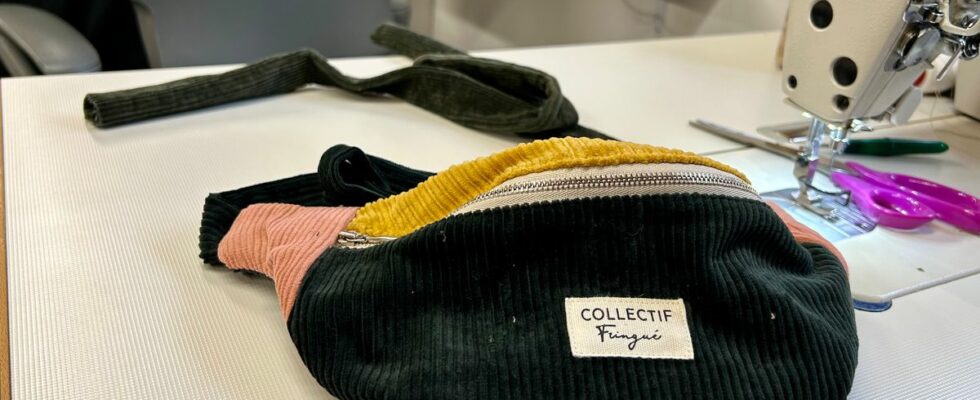Velvet skirts, bits of curtains or pieces of duvet covers. “You never put this at home, but in bananas, it looks so good! Exclaims Agathe, 30, rummaging through what she calls “her happy mess”. For a year and a half, this young entrepreneur has been “upgrading existing clothes” to make a unique, very fashionable accessory: the satchel.
“I recovered this fall from a tapestry that took it out of an old wardrobe, she proudly presents. She is over 50! “. Between thrift stores and resource stores, Agathe travels around the Lyon region to unearth these fabrics, offer them “a second life” and thus “make ethical fashion the norm of tomorrow” through her brand. Fringue Collective.
A brand to reduce its impact on the environment
Nothing really predestined Agathe to become a fashion designer. Employed indefinitely in marketing after a business school, she left everything and went to Asia. The health crisis is catching up with her. She then understands that she wants “to do something that makes sense”. “I’ve always had a taste for fashion and while traveling, I discovered the underside of fast fashion. I said to myself that we could not continue like this, ”she summarizes.
Attracted by the dynamics of Lyon and its reputation for small creators, the native of Rémoise moved in and launched Collectif Fringué. Originally, the brand made ready-to-wear clothes. But very quickly, she realizes. Her own thing is bananas. “I was already doing some with scraps of clothes to throw away as little as possible,” she explains. And the surplus of these bags then? “I use them to make scrunchies! she smiles. And the circle is complete. And even zipped. Because even the zippers are recycled: “They come from old factories in northern France,” she says. These businesses were going to close, so someone went to get these Zips and sent some to me. »
Bananas “made in Lyon”
In addition to this upcycling approach, Agathe strives to have something “made in France” and even “in Lyon”. “I work with two reintegration workshops and the company Emerjean*, in Villeurbanne, she explains. It was essential for me to know the names of the people who sew my brand’s accessories. At the same time, I wanted to allow audiences in socio-professional rupture to flourish through sewing. »
And the pleasure is shared by the seamstresses. Sonia arrived in Emerjean’s workshop in 2018 without “ever having touched a sewing machine”. She is now, with two other seamstresses, responsible for the production of Agathe. “Together, we thought about a prototype for an upcoming product,” she says proudly showing a small bag, made from jeans. “It’s more suitable for a mother than a bag,” she jokes.
Upgrading clothes and upgrading seamstresses
“I love making accessories now,” adds Sonia. We do everything from A to Z with our hands. In addition, we feel that we are progressing gradually thanks to Agathe’s demands. At first, you wonder what it will give. But when it’s over, you’re like, “Wow, I did that!” »
For Arta, 49, the exercise is simpler. “When I lived in Albania, I did this job for thirteen years, but it was on the assembly line in a big factory. Here, it has nothing to do. I take more pleasure in what I do. Halima, who supervises the textile workshop in Emerjean, concludes: “A collaboration such as the one with Collectif Fringué enhances the seamstresses. They feel that they matter and that they are part of a collective. It’s a real human adventure. »
*Emerjean, a Villeurbannaise company
*Emerjean is a company created in 2016, located in Villeurbanne, which has around a hundred permanent and part-time employees who had been unemployed for more than a year in the Saint-Jean district. Based on the skills of its employees, it develops activities that meet the needs of the district, its inhabitants, its businesses and the community.
“Thanks to the different activities that we have developed according to each person’s tastes, the employees quickly gain skills,” explains Halima, sector manager at Emerjean. For her, it is “a huge pride” to contribute to the development of these people. “They were unfairly excluded from employment, often because of discrimination, and now they are considered and do what they like, without it going through associations. »

